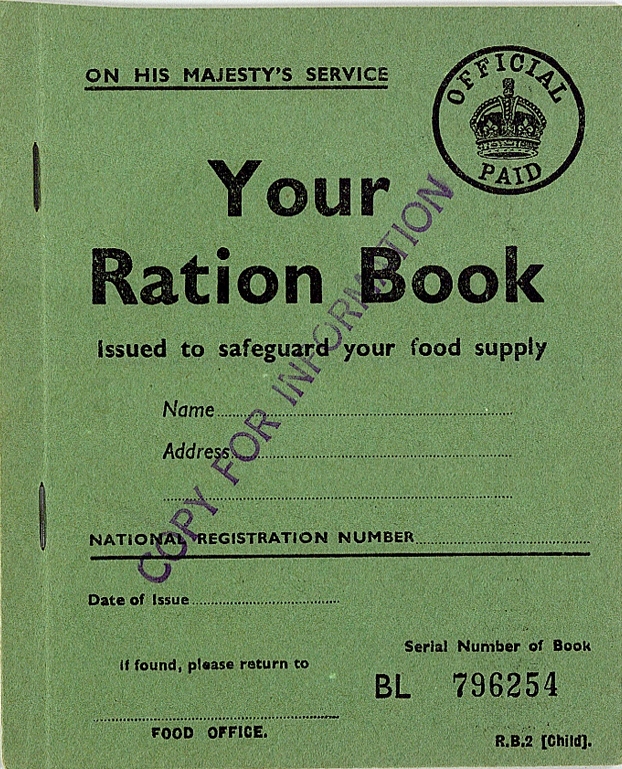
I learned this today. Rationing in the UK during World War 2 started in September 1939 and ended on July 4th, 1954.
Rationing is not an idea that started in the Second World War. People have always rationed when food is scarce. Often, during battles, towns were besieged. The idea would be to starve the enemy into submission and food inside the city would be rationed in the hope that the people could outlast the besiegers.
What the Second World War did do is bring far more things under rationing. In the UK, there was rationing throughout the First World War. Germany sailed U-boats up and down the Atlantic attempting to stop all merchant ships coming from America and Canada. An incredibly large amount of Britain’s food was imported and the Germans saw this as a chance to win the war. They may have succeeded if America hadn’t entered the war. One of the consequences of sinking ships in the Atlantic was that many of them were American ships and that brought America into the war.
During World War 1, Britain rationed butter, margarine, lard, meat, and sugar. The rationing lasted beyond the end of the war and stopped in 1921. There is some evidence that people’s health improved during rationing because they ate more vegetables and fewer things that were bad for them.
It can be said that the First World War took people by surprise, but the British government was ready for World War 2. They had spent a few years analyzing what the effects of rationing might be and trying to work out if Britain could produce enough food to survive through the war. It turned out that people could be perfectly healthy under rationing and that Britain was far from self-sufficient. However, through the “Dig for Britain” campaign, Britain was almost completely self-sufficient by the end of the war.
At the start of World War 2, the Germans tried to blockade Britain again. The government responded by introducing rationing. The first thing on the list was gasoline. That made sense because it was needed for the war effort. From January 8th, 1940, bacon, butter, sugar, meat, tea, jam, biscuits, cereal, cheese, eggs, lard, milk, canned, and dried fruit were rationed. By 1942, almost all food was rationed. Fruit and vegetables were never rationed but, unless you grew your own, there weren’t a lot of them.
The same thing happened under rationing in World War 2 as had happened in World War 1. People became healthier. Everyone had a balanced diet with more vegetables and vitamins than they were used to. There was also less sugar and fat, so fewer unhealthy meals. A large number of people were doing very strenuous labor as well, which would have been pretty regular exercise.
By the end of the war, clothes, paper, razor blades, and Christmas trees were rationed. Everybody put up with it because there was a war on, and because they thought it would end as soon as the war ended. Only it didn’t. So, why did rationing continue until 1954? There are several reasons.
The most obvious reason is that there still wasn’t enough food. Once the war ended, America stopped supplying food to Britain. They had to start worrying about their domestic market again.
As the war effort fizzled out, the Dig for Britain campaign began to be forgotten and people started to go into regular jobs. Fewer people worked the land, which meant less food.
Britain was also supplying food to a lot of the displaced and war-torn people of Europe. There were millions of homeless people and most of the countries that Germany had occupied were starving. Germany had commandeered all of the food for their war effort. Britain decided to help these people, which cut the amount of food Britain had.
There were several bad harvests and years of bad weather which also cut down the amount of food available. Torrential rain ruined wheat crops and rare deep snow destroyed a huge amount of potatoes. Bread and potato rationing started in 1946 and 47.
In 1950, the general election was contested on the subject of rationing. People were getting very sick and tired of it. A Labor government was voted in, but they didn’t seem able to end the rationing and within a year and a half, the Conservatives were back in power again with Winston Churchill back at the helm. They made more of a concerted effort and rationing was quickly phased out. Candy and sugar rationing ended in 1953 and all rationing was ended in 1954. People had put up with it for a very long time. And this is what I learned today.
If you read this far, I would appreciate a like and a follow.
Image By The National Archives UK – Your Ration BookUploaded by oaktree_b, Public Domain, https://commons.wikimedia.org/w/index.php?curid=21041876
Sources:
https://en.wikipedia.org/wiki/Rationing
https://en.wikipedia.org/wiki/Rationing_in_the_United_Kingdom
https://en.wikipedia.org/wiki/Unrestricted_submarine_warfare
https://www.iwm.org.uk/history/what-you-need-to-know-about-rationing-in-the-second-world-war
https://www.1900s.org.uk/1940s50s-rationing-shortages-post-war.htm
